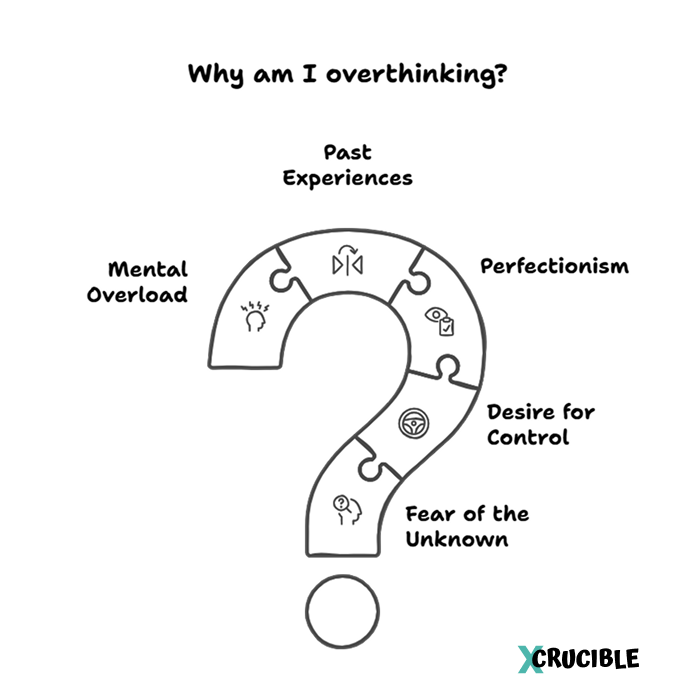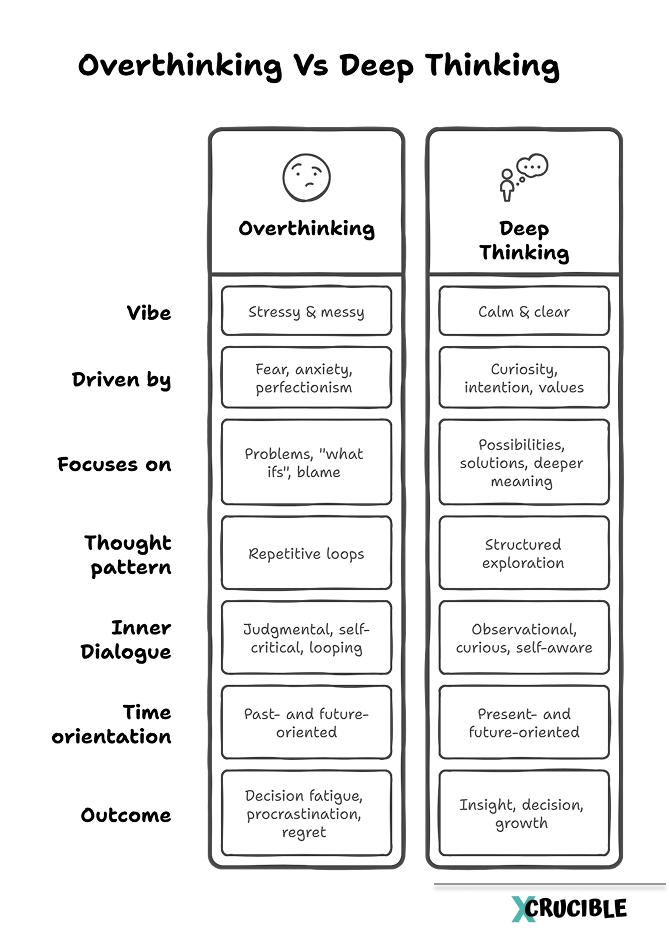At first glance, overthinking and deep thinking seem like cousins. Both involve chewing on thoughts, right?
These two feel similar, but they lead you down very different roads. One leaves you stuck. The other moves you forward.
So, how do you know which one you’re doing? Let’s break it down.
What Is Overthinking?
Overthinking happens when your mind gets stuck in a loop of anxious, repetitive thoughts without clear direction. It often feels like you’re doing something — but really, you’re just running mental marathons and going nowhere.
It often shows up as:
- Endless “what ifs”
- Replaying the past or fearing the future
- Paralysis by analysis
According to psychology, overthinking is linked to anxiety and often stems from fear of failure, rejection, or uncertainty.
When you overthink, a part of your brain called the Default Mode Network (DMN) becomes active. This network is linked to mind-wandering, self-reflection, and replaying memories — especially during stress or when your mind is idle. It’s where repetitive “what-if” thoughts and self-criticism happen.
Example:
You know that moment when you send a text… and then spend the next hour wondering if it sounded weird? That’s overthinking.
What Is Deep Thinking?
Deep thinking is focused, intentional reflection. It involves exploring ideas calmly and purposefully to understand problems better and make clear decisions.
Deep thinking lets you:
- Reflect without judgment
- Ask better questions
- See the bigger picture
- Make solid decisions
Big ideas? Life changes? Creative breakthroughs? All born from deep thinking.
Deep thinking activates your Central Executive Network (CEN)—the part of your brain responsible for focus, planning, and problem solving. When engaged, it supports clear, goal-driven thinking and helps you make thoughtful decisions.
Example:
You finish a project and spend time considering what worked well and what you can improve for next time. That’s deep thinking.
Overthinking vs Deep Thinking: Key Differences
Are You Overthinking or Deep Thinking?
Now that you know the differences between overthinking and deep thinking, here’s a quick way to find out where you stand.
Read each statement below. If it sounds like something you often experience, mark Yes. If not, mark No.
Score Yourself: Count how many times you said “Yes”
0–2: You mostly engage in deep thinking — your thoughts are intentional and focused.
3–5: You’re somewhere in between — sometimes thoughtful, sometimes stuck. Awareness helps shift the balance.
6–8: You’re likely overthinking — caught in mental loops without clear outcomes. But you can train your way out of it.
No stress if you’re overthinking — awareness is the first step to thinking better. You’ve already started.
Why Do You Overthink?
Overthinking isn’t a flaw — it’s your brain trying to protect you. But sometimes, it goes too far. Here are common reasons why overthinking happens:

1. Fear of the unknown
When you don’t have all the answers, your brain fills in the blanks — usually with worst-case scenarios. It thinks worrying = preparing.
2. Desire for control
Feeling out of control makes you go over every possibility, giving a false sense of managing the situation—even if nothing changes.
3. Perfectionism
If you believe there’s one “perfect” answer or outcome, your brain will keep searching for it — which can trap you in mental loops.
4. Past experiences
If something went wrong before, your brain tries to prevent it from happening again. So it replays, analyzes, and clings to details — just in case.
5. Mental overload
Too much input — news, opinions, to-do lists — can overwhelm your brain, making it hard to think clearly.
How to Shift from Overthinking to Deep Thinking
Want to go from stuck to smart thinking? Try out these tools for mental clarity:
1. The 10–10–10 Rule (by Suzy Welch)
Ask yourself:
How will I feel about this 10 minutes from now?
How about 10 months from now?
What about 10 years from now?
It pulls your mind out of the moment’s pressure and forces long-term clarity.
2. First Principles Thinking (used by Elon Musk)
Break the problem into its most basic facts, ignoring assumptions. Then rebuild your understanding from those facts..
Example: “Why am I scared to publish this blog?”
→ Not fear of writing, but fear of being judged. Now you know what to really address.
3. Cognitive Defusion (from Acceptance and Commitment Therapy)
Change how you relate to your thoughts:
Instead of saying “I’m not good enough,” reframe it as:
“I’m having the thought that I’m not good enough.”
It helps you detach from your thoughts so you can observe, not drown in them — a key shift for deep thinking.
Believe or not:
You can’t stop overthinking by forcing it away. Instead, replace those thoughts with clear, intentional thinking focused on your goals.
Real-Life Example: Same Problem, Two Mindsets
Scenario 1: You didn’t get the job you wanted.
Overthinking:
“Did I say something wrong? Should I have worn a different shirt? What if they hated my answer to that last question? Maybe I’m just not good enough…”
Deep thinking:
“Okay, what can I learn from this? Was there something I could improve for next time? Maybe I’ll reach out for feedback.”
Scenario 2: Starting Something New
Overthinking:
“There are already people doing this. What if I fail? What if I look stupid?”
Deep Thinking:
“What’s unique about my approach? What do I need to learn before I start? Who can I ask for feedback?”
See the difference? One leads to self-doubt. The other leads to growth.
Final Thoughts
Here’s the truth most people skip:
Overthinking and deep thinking aren’t fixed personality traits — it’s a habit. And habits can be unlearned and retrained.
So next time your brain starts buzzing, pause and ask:
“Am I solving the problem, or just spinning in circles?”
You’ll know exactly what to do.
